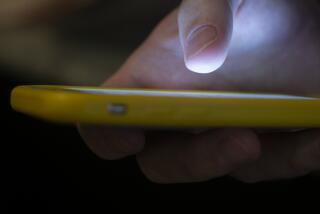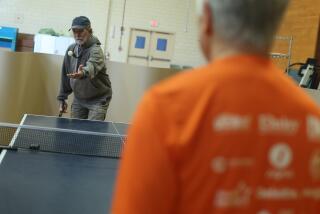Opinion: The last thing anyone needs to hear when calling a suicide hotline is ‘your call may be recorded’
- Share via
Since September, the last thing a caller to the National Suicide Prevention Lifeline hears before being connected to a counselor is this: “Your call may be monitored or recorded for quality assurance purposes.”
As a Lifeline counselor, this alarms me.
Suicide is the 10th-leading cause of death in the U.S., and rates have increased in nearly every state from 1999 through 2016, according to the Centers for Disease Control and Prevention.
A person contemplating suicide is often dealing with societal prejudice surrounding mental health. When people call the hotline, they are often sharing secrets. Children may worry they are disappointing their parents by struggling with depression or other problems. Adults may fear losing their livelihood if their struggles become public.
In contrast, a suicide hotline counselor is a stranger on the phone who has been trained to connect and provide help. A private conversation used to be implicit. Now this sense of confidentiality is at risk, and it could have dire consequences.
When Lifeline counselors were informed that callers would hear the call “may be recorded” addition to the greeting, I felt ill. I quickly emailed the director of our local call center in Pennsylvania, expressing concern about what experienced Lifeline counselors know with certainty: A sense of anonymity is essential for many callers.
The response I received explained that many Lifeline call centers already record the calls. Since our calls are routed, they’re directed to a call center based on area code. For example, if someone is standing in California with a phone number starting with 609, their call will be sent to a New Jersey Lifeline call center. The notification prompt was added to comply with differing state wiretapping laws.
Federal and most state laws require one-party consent, meaning the recorder does not have to reveal the call is being recorded. But 11 states — including California and Pennsylvania — require two-party consent; all parties must be informed the call is being recorded.
Such a bureaucratic reason doesn’t take into consideration the emotional state of the person in crisis. Being told you “may be recorded” may inhibit people from sharing their distress with a Lifeline counselor.
As one of those counselors, I thoroughly understand why a caller to a suicide prevention line needs to speak with someone who will listen without judgment. I was once in a similar place. I woke up every day thinking the mental anguish would never end. A smiling mask hid my pain and helped me push through each day. My family encouraged me to get help. I started by seeing my family doctor, who referred me to a psychiatrist.
Since the greeting change was announced, I have spoken to at least 50 suicide prevention specialists, including therapists and social workers. They all had my same reaction — the prompt will cause callers with privacy concerns to hang up. The policy is putting lives at risk.
Vibrant Emotional Health, the administrator of Lifeline, distributed a “tip sheet” explaining how to address callers’ concerns about being recorded. For instance, if a caller expresses discomfort with being recorded, counselors were advised to “fully explore and address the caller’s feelings about call recording before attempting to proceed” with the call.
But the problem is not people who question us about being recorded. It’s people who hang up without talking to a counselor that concerns us. How many people have already hung up because of the “may be recorded” prompt?
Lifeline keeps track of callers who hang up but does not make the data public. It is impossible to know how many callers change their minds about talking to a counselor simply because they don’t want the conversation recorded.
The Federal Communications Commission has proposed making it easier for people to call the National Suicide Prevention Lifeline by replacing the current 10-digit number with a three-digit hotline, 988. Mental health advocates say it will make it easier for people in crisis to seek help.
Just as the public learned to call 911 in an emergency after the number was established in the late 1960s, they will likely learn to call 988 when in crisis.
But a major difference would distinguish the lines: Although 911 calls are routinely recorded, callers do not necessarily receive a verbal reminder in two-party consent states. A beep-warning tone is generally transmitted over the line to indicate the conversation is being recorded. That’s much subtler than the prompt heard by callers to the National Suicide Prevention Lifeline.
Two months before the “may be recorded” prompt was added, I fielded a call from a 13-year-old girl. She was weeping, huddled in an empty classroom. She said she had thoughts of harming herself. Out of shame or fear, the young caller would not go to the school nurse or tell me her parents’ phone numbers.
After we had talked for another 20 minutes and developed some rapport, I said, “We need to get an adult to comfort you.” At that point, she gave me her dad’s work phone number. I called him, and he immediately went to rescue her.
A simple fact without an answer haunts me: How many calls like this have I missed since September because someone hung up once they learned this call “may be recorded”?
Ray Regan is a National Suicide Prevention Lifeline counselor and a member of the Chester County, Pa., Suicide Prevention Task Force.
More to Read
A cure for the common opinion
Get thought-provoking perspectives with our weekly newsletter.
You may occasionally receive promotional content from the Los Angeles Times.










